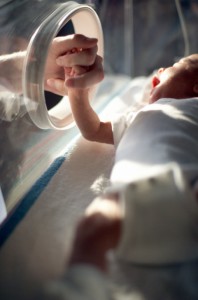Birth Injury Lawsuit Alleges Severe, Permanent Disability to Child
 A mother has filed a medical malpractice case on behalf of her injured daughter, alleging delays in her delivery led to her child’s permanent disability. The plaintiff is holding the United States of America liable for her injuries, claiming the physicians overseeing her daughter’s delivery were employees of the federal government at the time.
A mother has filed a medical malpractice case on behalf of her injured daughter, alleging delays in her delivery led to her child’s permanent disability. The plaintiff is holding the United States of America liable for her injuries, claiming the physicians overseeing her daughter’s delivery were employees of the federal government at the time.
According to the plaintiff’s birth injury lawsuit, the United States Department of Health and Human services has denied these claims.
Labor induced for mother
The plaintiff was admitted to a Michigan hospital on July 5, 2012, for labor induction. At the time, the mother was determined to be in her 41st week of pregnancy and had not begun labor contractions on her own. Labor induction began at 8:30 a.m., with a single dose of Misoprostol, a drug that is sometimes used to induce labor in these types of situations.
Labor appeared to progress normally until around 12:38 p.m., when fetal heart tones began to slow down. The deceleration lasted more than an hour, and was noted by one of the physicians overseeing the plaintiff’s labor and delivery. Despite the concerning change and possible fetal distress, no move was made to initiate a Cesarean delivery until 3:34 p.m., when an anesthesiologist was called. The delivery by C-section was finally performed at 4:34 p.m.
Baby’s Apgar scores zero
At the time of birth, the baby’s Apgar scores were both zero, indicating no heartbeat or respirations. The Apgar scores remained at zero five minutes after the baby’s birth. The baby was eventually resuscitated through intubation and transferred to another hospital, where she was eventually diagnosed with hypoxic-ischemic encephalopathy.
Hypoxic-ischemic encephalopathy a brain injury caused by oxygen deprivation to the brain. This condition often causes death in newborns and those that do survive may suffer neurological impairment, developmental delays, cognitive impairment and motor impairment. Because there is no way to reverse the damage caused by this condition, treatment focuses on helping the child cope with symptoms that result from the brain injury. Impairments will become more apparent in the early years of the child’s life.
Permanent disability due to birth injuries
According to the complaint, the plaintiff child now has permanent birth injuries, including developmental delays, neurological deficits, cerebral palsy and seizures. The child will need ongoing medical care, as well as assistance with daily tasks like personal hygiene. An affidavit from a healthcare professional that was submitted with this complaint stated that if the C-section had been performed just one hour earlier, it is likely none of these injuries would have occurred.
In addition to seeking damages for the cost of medical care and other care for her child, this mother plaintiff is seeking damages for herself. She is claiming she suffered from “adverse consequential effects” after witnessing her child’s injuries after birth, which have led to “severe emotional, nervous and mental disturbances.”
This birth injury claim was filed on February 13, 2015, in U.S. District Court for the Eastern District of Michigan. Both the plaintiff and her daughter reside in Michigan, which is also where the child’s birth took place.
- Medscape, Hypoxic-Ischemic Encephalopathy, http://emedicine.medscape.com/article/973501-overview
- CerebralPalsy.org, Hypoxic-Ischemic Encephalopathy, http://cerebralpalsy.org/about-cerebral-palsy/cause/hypoxic-ischemic-encephalopathy/
- Medscape, Birth Trauma, http://emedicine.medscape.com/article/980112-overview
- University of Rochester Medical Center, Birth Injury, http://www.urmc.rochester.edu/encyclopedia/content.aspx?ContentTypeID=90&ContentID=P02340


 Resources
Resources
 Resources
Resources
